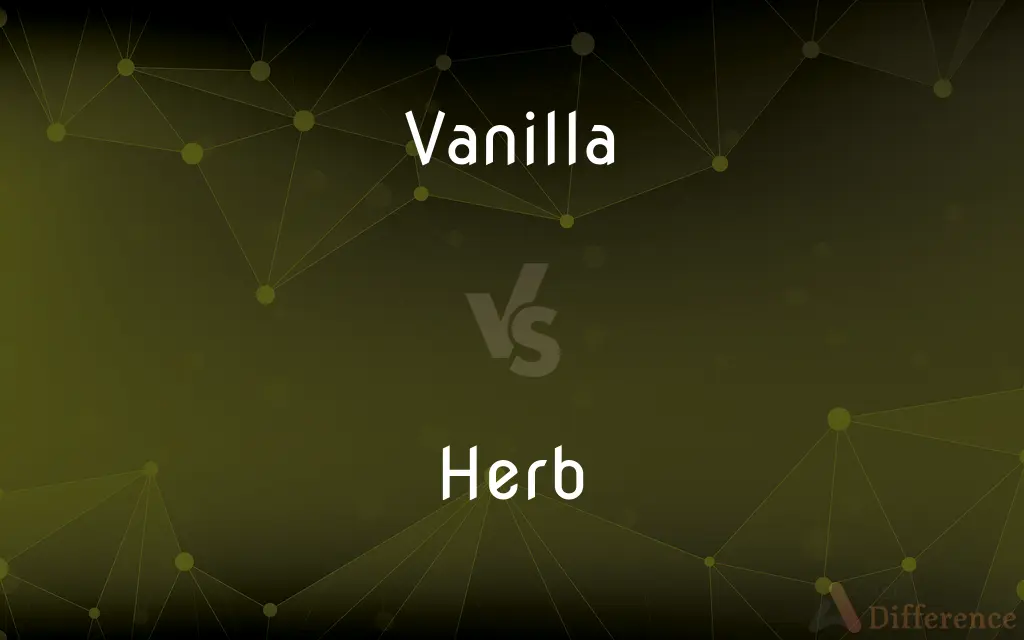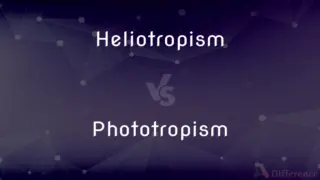Vanilla vs. Herb — What's the Difference?
By Tayyaba Rehman & Maham Liaqat — Updated on May 9, 2024
Vanilla is a sweet-flavored extract derived from orchid beans used in desserts, while herb refers to any plant with leaves, seeds, or flowers used for flavoring, food, or medicine.

Difference Between Vanilla and Herb
Table of Contents
ADVERTISEMENT
Key Differences
Vanilla, obtained from the beans of vanilla orchids, imparts a rich, sweet flavor primarily used in desserts like ice cream and baked goods. Herbs, on the other hand, can include a variety of plants such as basil, mint, and thyme, which often provide savory notes for culinary or medicinal purposes.
Vanilla is primarily used as an extract or flavoring, offering a distinct sweet taste. Herbs, whereas, are generally used in their natural form, fresh or dried, adding different flavors ranging from sweet to spicy.
Vanilla plants grow as climbing orchids in tropical regions, demanding careful pollination and long cultivation periods. Herbs like parsley or oregano are relatively easier to cultivate, thriving in various climates and growing rapidly.
Vanilla, despite its specific cultivation needs, remains a beloved flavoring worldwide, particularly in Western sweets. Herbs, meanwhile, enjoy versatile use in global cuisines, medicinal practices, and aromatherapy due to their varied properties.
Vanilla often appears in pure or artificial forms, allowing wide accessibility. Herbs, while also available dried or fresh, are sometimes region-specific due to diverse cultural applications.
ADVERTISEMENT
Comparison Chart
Definition
Extract from vanilla orchid beans
Any plant with flavoring or medicinal properties
Culinary Use
Primarily for desserts
In various cuisines, often savory
Cultivation
Tropical climbing orchid
Diverse plants, easier to grow
Flavor Profile
Sweet, creamy
Varies (sweet, spicy, savory)
Availability
Pure/artificial extract worldwide
Fresh/dried, regionally diverse
Compare with Definitions
Vanilla
A sweet flavoring extract derived from the vanilla orchid.
She added a teaspoon of vanilla to the cake batter.
Herb
A plant valued for its medicinal or culinary properties.
Mint is a popular herb for teas and flavoring.
Vanilla
A common, standard, or conventional version of something.
The software has a vanilla configuration for beginners.
Herb
A leafy plant used for seasoning.
Sprinkle fresh herbs over the salad for extra flavor.
Vanilla
In computing, unmodified software or systems.
This is the vanilla version of the operating system.
Herb
A plant whose leaves, seeds, or roots have medicinal use.
Chamomile is a calming herb used in teas.
Vanilla
The plant that produces vanilla beans.
The vanilla vines twined around the wooden posts.
Herb
Any non-woody plant, typically annual or perennial.
The herb garden thrives with basil, thyme, and sage.
Vanilla
A scent or aroma reminiscent of vanilla.
The candle had a pleasant vanilla fragrance.
Herb
In botany, a plant that dies back annually.
Perennial herbs grow back each spring.
Vanilla
Vanilla is a spice derived from orchids of the genus Vanilla, primarily obtained from pods of the Mexican species, flat-leaved vanilla (V. planifolia). The word vanilla, derived from vainilla, the diminutive of the Spanish word vaina (vaina itself meaning a sheath or a pod), is translated simply as "little pod".
Herb
In general use, herbs are a widely distributed and widespread group of plants with savory or aromatic properties that are used for flavoring and garnishing food, for medicinal purposes, or for fragrances; excluding vegetables and other plants consumed for macronutrients. Culinary use typically distinguishes herbs from spices.
Vanilla
A substance obtained from vanilla pods or produced artificially and used to flavour foods or to impart a fragrant scent to cosmetic preparations
Vanilla ice cream
Herb
A plant whose stem does not produce woody, persistent tissue and generally dies back at the end of each growing season.
Vanilla
A tropical climbing orchid that has fragrant flowers and long podlike fruit.
Herb
Any of various often aromatic plants used especially in medicine or as seasoning.
Vanilla
Any of various tropical American vines of the genus Vanilla in the orchid family, especially V. planifolia, widely cultivated for its long narrow seedpods, which yield an aromatic substance used especially as a flavoring.
Herb
(Slang) Marijuana.
Vanilla
The seedpod of this plant. Also called vanilla bean.
Herb
(countable) Any green, leafy plant, or parts thereof, used to flavour or season food.
Vanilla
A flavoring extract prepared from the cured seedpods of this plant or produced synthetically.
Herb
(countable) A plant whose roots, leaves or seeds, etc. are used in medicine.
If any medicinal herbs used by witches were supposedly evil, then how come people from at least the past benefited from the healing properties of such herbs?
Vanilla
Flavored with vanilla
Vanilla pudding.
Herb
Cannabis.
Vanilla
Scented with or smelling like vanilla
Vanilla perfume.
Herb
A plant whose stem is not woody and does not persist beyond each growing season
Vanilla
Lacking adornments or special features; basic or ordinary
“a delicious twist to a vanilla plot” (Ian O'Connor).
Herb
Grass; herbage.
Vanilla
White or off-white in color
A vanilla suit.
Herb
A lame or uncool person.
Vanilla
(countable) Any tropical, climbing orchid of the genus Vanilla (especially Vanilla planifolia), bearing podlike fruit yielding an extract used in flavoring food or in perfumes.
Herb
A plant whose stem does not become woody and permanent, but dies, at least down to the ground, after flowering.
Vanilla
(countable) The fruit or bean of the vanilla plant.
Herb
Grass; herbage.
And flocksGrazing the tender herb.
Vanilla
(uncountable) The extract of the fruit of the vanilla plant.
Herb
A plant lacking a permanent woody stem; many are flowering garden plants or potherbs; some having medicinal properties; some are pests
Vanilla
(uncountable) The distinctive fragrant flavour/flavor characteristic of vanilla extract.
Herb
Aromatic potherb used in cookery for its savory qualities
Vanilla
(uncountable) Any artificially produced homologue of vanilla extract, principally vanillin produced from lignin from the paper industry or from petrochemicals.
Vanilla
Someone who is not into fetishism.
Vanilla
An unmodded version of a game.
Vanilla
A yellowish-white colour, like that of vanilla ice cream.
Vanilla
(of flavor, etc.) Of vanilla.
Vanilla
Standard, plain, default, unmodified, basic.
Vanilla JavaScript
Vanilla
Plain; conventional; unimaginative.
Vanilla
A genus of climbing orchidaceous plants, natives of tropical America.
Vanilla
The long podlike capsules of Vanilla planifolia, and Vanilla claviculata, remarkable for their delicate and agreeable odor, for the volatile, odoriferous oil extracted from them; also, the flavoring extract made from the capsules, extensively used in confectionery, perfumery, etc.
Vanilla
Any of numerous climbing plants of the genus Vanilla having fleshy leaves and clusters of large waxy highly fragrant white or green or topaz flowers
Vanilla
A flavoring prepared from vanilla beans macerated in alcohol (or imitating vanilla beans)
Vanilla
A distinctive fragrant flavor characteristic of vanilla beans
Common Curiosities
Do vanilla and herbs have medicinal uses?
Vanilla has calming properties, while herbs like peppermint or chamomile are used for digestion and relaxation.
Is vanilla an herb?
No, vanilla is derived from orchid beans and is classified as a spice.
Can you grow vanilla and herbs at home?
Vanilla cultivation requires specific tropical conditions, while many herbs grow well in home gardens.
Do all herbs have strong flavors?
No, herbs vary widely in flavor; some, like parsley, have a mild taste, while others, like rosemary or sage, are more robust.
Can vanilla be used in savory dishes?
Yes, vanilla is occasionally used in savory sauces and marinades, often paired with seafood, to add a subtle sweetness.
Do vanilla and herbs have different storage needs?
Yes, vanilla extract should be stored in a cool, dark place, while herbs should be kept in airtight containers, preferably dried.
Are vanilla beans and extracts different?
Yes, vanilla beans are the raw form, while extracts are processed for easier culinary use.
What are some popular desserts that feature vanilla?
Vanilla is often used in desserts like ice cream, custards, cakes, and cookies, providing a classic sweet flavor.
Are herbs more versatile than vanilla?
Yes, herbs have broader culinary and medicinal uses compared to the primarily sweet flavoring role of vanilla.
What is the difference between herbs and spices?
Herbs typically come from the leafy parts of plants, while spices are derived from seeds, roots, bark, or other non-leafy parts.
Can I substitute vanilla extract with other flavors in recipes?
Yes, flavors like almond, maple, or citrus extracts can be used as substitutes, but they will alter the final taste.
What gives vanilla its distinct flavor?
The compound vanillin provides the characteristic flavor and aroma of vanilla, along with other minor compounds in the bean.
Are herbs only used in cooking?
No, herbs are also used in traditional medicine, aromatherapy, teas, and even cosmetics.
Are all herbs safe to consume?
Not all herbs are safe to ingest; some, like foxglove, can be toxic. Always research or consult experts before consuming unknown plants.
How is vanilla harvested?
Vanilla beans are carefully hand-pollinated, harvested when mature, and then cured through a long fermentation process to develop their flavor.
Share Your Discovery

Previous Comparison
Squid vs. Prawn
Next Comparison
Heliotropism vs. PhototropismAuthor Spotlight
Written by
Tayyaba RehmanTayyaba Rehman is a distinguished writer, currently serving as a primary contributor to askdifference.com. As a researcher in semantics and etymology, Tayyaba's passion for the complexity of languages and their distinctions has found a perfect home on the platform. Tayyaba delves into the intricacies of language, distinguishing between commonly confused words and phrases, thereby providing clarity for readers worldwide.
Co-written by
Maham Liaqat















































